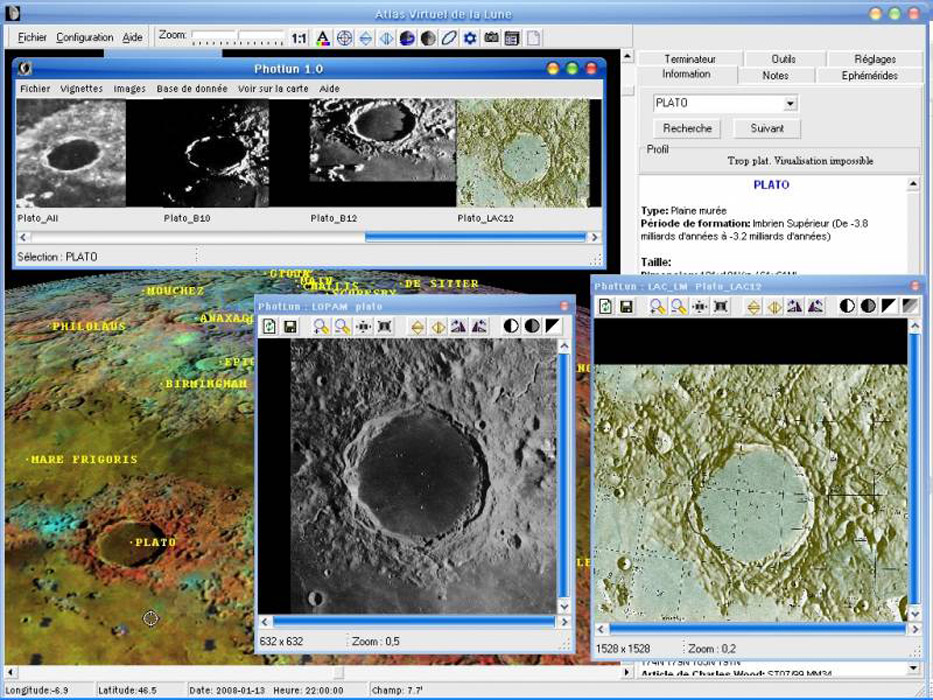LPOD May 23, 2008
VIRTUALLY PERFECT

image from Virtual Moon Atlas of Christian Legrand and Patrick Chevalley
A few days ago I bemoaned the difficulty of working with diverse lunar data sets. But already the situation is much better with the announcement of a greatly improved version of an already wonderful product, Virtual Moon Atlas. The new Pro 4.0 version includes more professional data sets and the very best of amateur images, all seamlessly accessible from a graphic interface. One of the major improvements is the use of Lunar Orbiter IV images that were destriped following the procedure of Niels Noordhoek. One new database is the catalog of about 100 pyroclastic deposits mapped by US Geologic Survey and coworkers. These often large volcanic ash units have been widely overlooked by amateurs but now are just a click away. The new VMA also shows thousands of images from Earth including the best from the master imagers Paolo Lazzarotti and Wes Higgins, plus new tools to enhance and modify the images. Finally, the Pro 4 version includes a totally separate piece of software, PocketLun, which displays extensive information about the terminator location and visibility of features on a Pocket PC. Christian Legrand and Patrick Chevalley created VMA six years ago and have shared it with nearly a half-million users. VMA could easily have been the foundation of a very successful commercial software company, but they continue to give it away. There are no awards for altruism in astronomy, but if there were Christian and Patrick would win first place. Merci, messieurs!
Chuck Wood
Technical Details
VMA only runs under the WIndows operating system, but it is so good that I am going to degrade my Mac with the PC emulator so I can have daily access to VMA!
COMMENTS
To post comments regarding this LPOD, please click here and enter your text in the space below. You will not see the Edit tab unless you register for the wiki. Please do not edit the LPOD itself!
(1) The "Virtual Moon Atlas" (VMA) looks like a really useful product. I may be wrong, but when I visited the website briefly I got the impression there is no easy "Click Here" button to download VMA. (??) Is the free download the same as the 20 Euro CD version? Does the program install easily and automatically on a Windows PC, or does it require tweaking, etc.?
I bought a copy of Christian Legrand's book "Discover the Moon" about two years ago. It introduced me to observing the Moon and to what has become a very enjoyable pastime. I highly recommend it. It's a very practical and useful observer's guide.
I also, of course, have a copy of "The Modern Moon" and Sky & Telescope's "Field Map of the Moon." I recommend all three publications to anyone who wants to observe and learn about the Moon.
--Bill
(2) Bill,
If you go to the web page that Chuck mentions, and point your mouse to the place where it says "NEW ! VMA" Pro" version 4.0" that should turn into a link which takes you here to initiate a free download. If the download doesn't initiate that way, you will probably see a "Direct download" link and a "Download" tab on the page you go to. You should be able to get the file from any of those. You can also download the lesser versions in the same way; and although the VMA page doesn't make it clear, each version includes all the lesser ones within it (i.e. VMA Pro 4.0 includes all the others).
I downloaded the 450 MB to a flash drive in just a couple of minutes at the local university library (where they have a very fast internet connection), and when I brought it home it installed fine on my very old Windows XP machine simply by double-clicking on the "setup.exe" icon inside the zipped folder (no need to unzip it, apparently).
Another thing that's not clear is which pictures are included in the main download and which are not. The web page mentions that you have to download the "Best of Amateurs" set separately. This involves another setup file ("avlbestamateur2.exe") which you download from the main page in the same way as for the program file. When you double-click on the downloaded file, the pictures are installed, although you have no way of knowing what pictures or where they are going. Whether downloading and installing the other picture files is redundant or not is unclear. Unfortunately (to the best of my knowledge) none of the pictures have any identifying information as to when they were taken, with what kind of instrumentation, etc. Nor (I think) can they be retrieved unless they happen to be named after the feature you're interested in.
I guess the CD includes all these optional files without the guesswork.
-- Jim Mosher
(3) Thanks, Jim. Perhaps purchasing the CD would be the best way to go. Given the described capabilities of the software, the price no doubt is a bargain.
--Bill